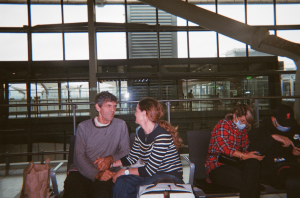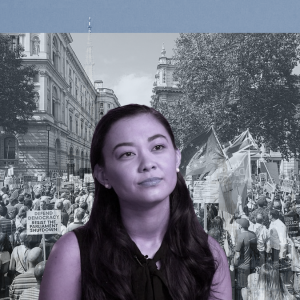
The Politics of Representation
by Jorrit Donner-Wittkopf | September 13, 2019
Earlier this year, the former environment secretary, Michael Gove, spoke repeatedly of a ‘climate emergency’, trumpeting that the UK would be carbon neutral by 2050. This was before he trotted off to cut the ribbon on a gargantuan construction project which will see a third runway built at Heathrow Airport. If the planned drone strike by activist group Heathrow Pause had one positive outcome, it is that the catastrophic paradox of the airport’s expansion was once again brought to public attention. Amidst the skullduggery of Brexit, Heathrow Pause reminded us yet again just how content the government is to promise one thing, and do something else entirely.
On all other counts, the planned drone strike seems to have been a massive mistake. One member of Heathrow Pause who spoke to The Isis, James Brown, inadvertently summarised his group’s defining flaw over the phone. “Individual action just doesn’t make a difference,” he said, referring to the dilution of political expression into consumer choices. But what Brown unwittingly pointed out is why the “disparate group of individuals” behind Heathrow Pause – to use his words – made a tremendous miscalculation. The planned drone strike on Heathrow Airport was a tactical snafu because it in itself was an individual action.
Heathrow Pause has been described as a splinter group of Extinction Rebellion by the likes of the BBC and the Guardian. This is a false claim: although one of its founding members Roger Hallam is among their number, Heathrow Pause’s activists were neither condoned nor condemned by Extinction Rebellion. What Extinction Rebellion does serve as is a litmus test for a successful environmental mass movement.
Last year’s ‘rebellions’ pushed the spectre of mass extinction into the popular conscious through civil disobedience. They achieved global success primarily because so many people joined in the protests. Activists only managed to sever cities’ arteries because they turned out in significant numbers. The vast crowds gathered at demonstrations lent Extinction Rebellion credibility, bestowed legitimacy on the movement, despite its illegal praxis. Those who disagreed with Extinction Rebellion’s demands or watched from the sidelines were forced to listen to the discussions it triggered. At the sit-ins, everywhere you looked there were hundreds of ‘rebels’ explaining and debating their cause with curious members of the public. Dialogue was encouraged by the movement’s ringleaders, but this dialogue was only possible because there were so many taking part in proceedings. Protests were unprecedented in both their scale and civility, and the ensuing chaos hogged the headlines longer than the famous 2003 anti-Iraq war demonstration or even the Poll Tax riots of the 1990s. Suddenly, a significant portion of the ‘respectable’ population was championing what had previously been viewed as a fringe cause. This resonated with demographics who were traditionally on the other side of the barricades. Extinction Rebellion saw to it that fervent environmentalism shed its historic baggage of stereotypes and idiosyncrasies, and moved toward the mainstream. In spite of the illegal and disruptive nature of the rebels’ direct action, they established their cause as valid.
Heathrow Pause can make no such claim of a popular mandate. It is a small group of people operating alone, in a manner which can easily be construed as ‘aggressive’. Their actions are therefore detrimental to the environmentalist cause. Yesterday, Brown’s voice broke a little as he told us, “It’s the most important thing I’ve ever done, and probably the hardest thing I’ve ever done”. It stings all the more, then, that his huge personal sacrifice will be mostly perceived as a disruptive blip on a Friday. Heathrow Pause is radical direct action planned in a country with limited patience for direct action, a tradition of radical protest which has been steadily eroded over the past several decades, and a historic penchant for ‘keeping the peace’ at home.
There is a further flaw in the plans of Heathrow Pause. It is that its members failed to consider how their actions might be framed by the media. To reach the public conscious you must first get it past the gatekeepers. Considering the vast majority of the British media has not been on the right side of the climate fight over the past decades, why gift the papers ammunition in their war of words? Direct action which pits drones against planes at Britain’s favourite airport is the doom merchant’s galore. Looking at diction alone, one can hardly imagine Heathrow Pause giving the media a more alarmist headline. ‘Drone’, a word synonymous with hellfire missiles descending on unsuspecting civilians, and ‘plane’, a mode of transport which one quarter of the population finds so terrifying, there’s even a designated phobia of flying (aviophobia). On top of all that, why promise to shut down an airport in the same week which already saw thousands of Britons’ holiday plans scuppered by British Airways pilot strikes?
Inspiration isn’t lacking. Hong Kong protestors hit the nail on the head when they descended on the city’s airport in their thousands earlier this month.
When we think about how to effectively force the government into acting on climate change, one of the first considerations should surely be: how will those who aren’t protesting react? Climate change is a problem which cannot be resolved without popular support: for government policy to change, public opinion needs to change. After all, there is no doubting the commitment of the individuals taking part in this action – and the fear that motivates them is not unwarranted. Just before hanging up, Brown said that he worries it is already too late to save the earth. He spoke of the gravest prediction he has read, by an American scientist who claims that there will be no human life left on the planet by 2026. Whether or not this prediction is wholly accurate, it is clear that we are in a state of climate emergency. What environmentalists around the world are gradually realising is that the best way to respond to that emergency is collective action; environmental activism achieves the most when it is a broad church. It follows, then, that those forging a new, 21st century environmentalism must remain acutely aware of the politics of representation.∎
Words by Jorrit Donner-Wittkopf. Additional reporting by Zehra Munir. Artwork by Léa Gayer de Mena.




